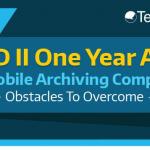The imminent Markets in Financial Instruments Directive (MiFID II) also brings forth a couple of mobile phone recording technologies that mainly caters to the needs of financial services firms across the European Union (UK).
MiFID II-approved enterprise mobile phone recording vendors mainly offers two methods to monitor, preserve, and secure enterprise SMS, MMS, mobile calls, and other electronic records: through an app or through an enterprise-issued SIM card that steer electronic communications through a network-based archiving server.
Aside from these two, there is a third solution, a hybrid that combines the features of an app-based mobile archiving solution and the reliability of a network-based archiver: The Enterprise number-based mobile phone recording approach.
To help you find the right solution, we will show you the benefits and limitations of each approach.
1. App-Based Mobile Phone Recording
This approach requires financial advisors and corporate broking firms to install a special native app on their mobile devices. This app allows employees to freely exchange text messages and make phone calls to their colleagues, then sends a copy of these communications through a vendor-owned cloud-based server or through a centralized archiving database to archive these records.
Benefits of App-Based Mobile Phone Recording
- App-based solutions are independent of the mobile network operator, which allows it to archive mobile communication no matter where the user is located.
- Many app-based archiving solutions works both for company-issued and BYOD devices.
- Some solutions allow the user to send text messages over Wi-Fi.
Limitations of App-Based Mobile Phone Recording
- Some apps run only on a specific mobile operating system.
- Latency issues can occur while waiting for the text message or voice call to be routed to firm’s telephone system or while waiting for second mobile call to be connected.
- Additional cost can be incurred when routing calls through the corporate telephone system due to additional mobile traffic and additional licenses required for the corporate archiving infrastructure to preserve mobile communications.
2. Network–Based Mobile Phone Recording
This method requires financial advisors and corporate broking firms to install a new SIM card which automatically routes text messages, MMS, and voice calls on the operator’s network or the firm’s on-premise centralized archiving server.
Benefits of Network-Based Mobile Phone Recording
- This approach has been viewed as the best option by many companies. It dismisses with many of the latency issues involved with an app-based method and provides more reliable mobile archiving service.
- Doesn’t require an app, so no lengthy installation process is needed, resulting in reduced cost and management complexity.
- Provide an improved user experience as there is minimal delay in connecting the call.
- Many modern solutions do not require local infrastructure changes as messages and calls are recorded in the cloud with recordings sent or downloaded.
Limitations of Network-Based Mobile Phone Recording
- Network-based mobile archiving solutions are often dependent on installing a new SIM card to identify when a message or call is made or received. This ties the archiving solution to a specific mobile network operator.
- Can only work on the enterprise-issued device, which means that a user cannot use their personal mobile number on the same device, which often rules out BYOD strategies.
3. Enterprise Number-Based Mobile Phone Recording
Both app-based and network-based MiFID mobile phone recording options have merits and demerits to provide to financial firms aiming to comply with recordkeeping requirements of MiFID II. However, a new approach is now becoming more popular today: enterprise number archiver.
This approach provides the benefit of a MiFID mobile phone recording service that captures all business messages and calls on personal phones while enabling the user to keep their personal number and communication private.
Benefits of Enterprise Number-Based Mobile Phone Recording
- The employee can keep two separate numbers on one device, making it easier to track all the business communications made and received through on the device, while ensuring the employee’s privacy at the same time.
- With a ‘two numbers, one phone’ model, business calls are billed directly to the company, while personal calls are charged to the user, thus eliminating unruly claim expenses by employees.
- Enterprise mobile is archiving vendors often offer this solution with a secure messaging app which can be deployed on either company-owned or BYOD devices.
- Many solutions are compatible with different mobile operating systems such as iOS and Android.
- Can deposit mobile messages and calls with any email archiving vendor.
Limitations of Enterprise Number-Based Mobile Phone Recording
- The only limitation of this approach is that it is also app-based, which may require updates and/or changes to the software from time to time.
Overall, choosing the right MiFID mobile phone recording solution for your financial firm requires strong consideration of your existing policies, and the extent of MiFID II impact to your overall organization. It is even more crucial to select the right vendor that is capable of helping your financial firm meet the requirements of MiFID II mobile recording.
As a Vendor Directory participant, the TeleMessage Mobile Archiver offers Alternative Investment Management Association (AIMA) member firms the most comprehensive mobile text archiving platform, allowing corporates to capture and retain mobile communication including SMS, MMS and Voice call of their employees, as required by MiFID Article 51(3).

To learn more how you can archive your mobile communications with the TeleMessage solutions, visit our website today at www.telemessage.com





